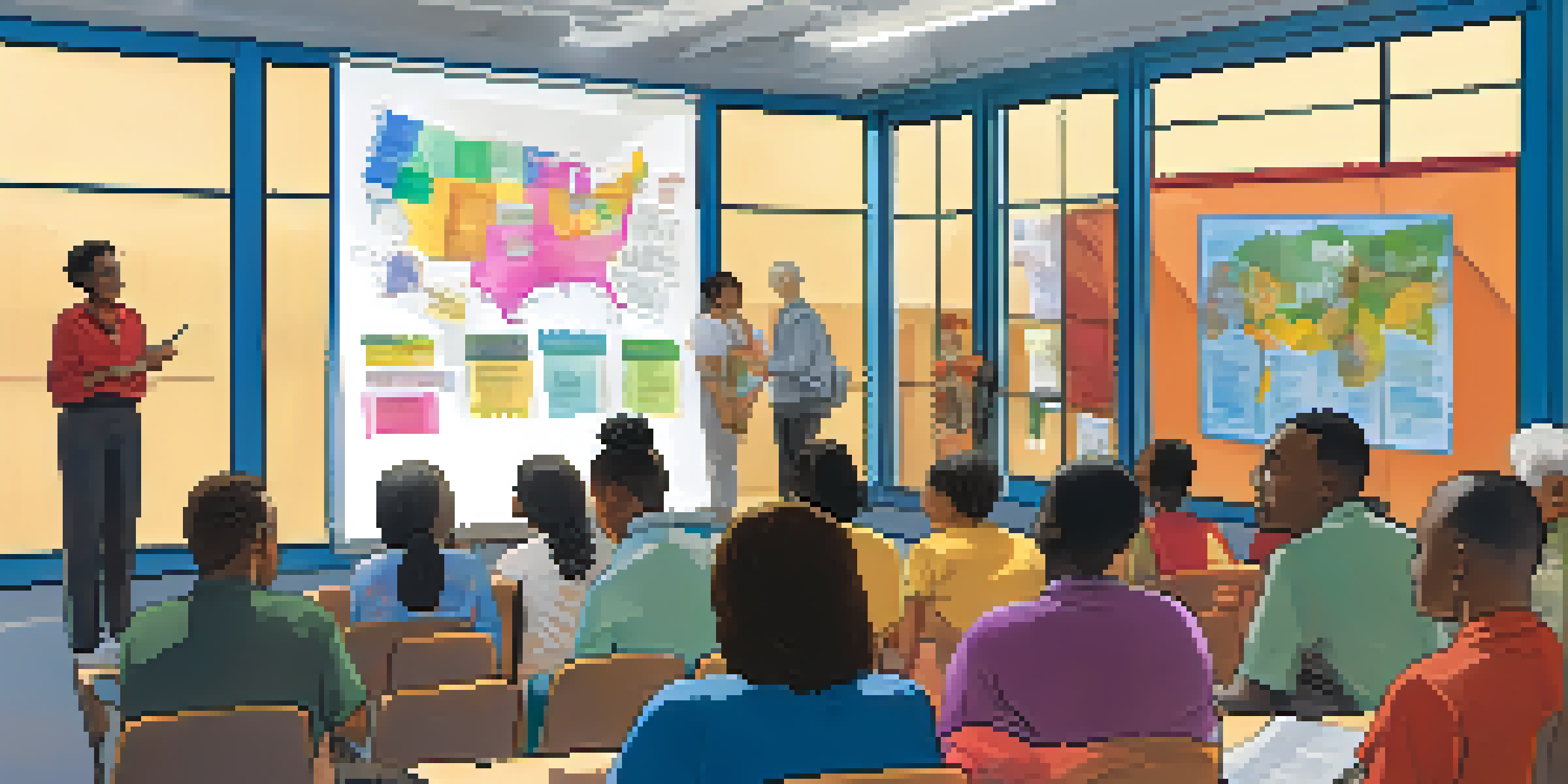The Impact of Civic Education on Voter Participation in LA

Understanding Civic Education and Its Importance
Civic education refers to the teaching of the rights and responsibilities of citizenship. It plays a crucial role in fostering informed and engaged citizens who understand how government systems work. In places like Los Angeles, where diversity abounds, civic education helps bridge gaps in understanding among different communities.
Democracy is not a spectator sport.
By learning about civic duties, individuals can see how their participation affects local and national issues. This understanding can empower them to become active participants in democracy, rather than passive observers. Ultimately, a well-informed citizenry is vital for the health of any democracy.
Moreover, civic education equips citizens with the skills needed to critically analyze political information and engage in meaningful discussions. This kind of knowledge is essential, especially in a city like LA, where local issues often intersect with broader national debates.
The State of Voter Participation in Los Angeles
Voter participation in Los Angeles has historically been a mixed bag, with various factors influencing turnout rates. In recent elections, many residents have expressed frustration over low engagement, particularly among younger voters. Understanding the reasons behind these trends can help address the barriers to participation.

Factors such as accessibility, awareness, and apathy contribute to the low voter turnout. Many potential voters may not know when or how to vote, leading to disengagement from the electoral process. This is where civic education can step in, providing the necessary tools to navigate the voting landscape.
Civic Education Empowers Citizens
Civic education fosters informed citizens who understand their rights and responsibilities, promoting active participation in democracy.
Additionally, demographic shifts in Los Angeles create unique challenges and opportunities for voter participation. Engaging with diverse communities through tailored civic education programs can help ensure that all voices are heard and represented in the electoral process.
Civic Education Programs in Los Angeles
Various organizations in Los Angeles are dedicated to enhancing civic education through innovative programs. These initiatives aim to teach residents about their rights and the importance of voting, especially among underrepresented communities. By creating accessible learning environments, they encourage active civic participation.
In a democracy, the citizen is the most important person in the room.
For instance, workshops, seminars, and outreach programs are designed to make civic education engaging and relevant. These programs often include real-world scenarios that illustrate the impact of voting on local issues, making the information more relatable. This hands-on approach helps demystify the voting process.
Moreover, partnerships between schools, local governments, and community organizations bolster these efforts. By working together, they can reach a broader audience and promote a culture of civic engagement throughout Los Angeles.
The Role of Technology in Civic Education
In today’s digital age, technology plays a significant role in civic education and voter engagement. Online platforms provide easy access to information about voting processes, candidates, and local issues. This accessibility can help demystify the voting experience, encouraging more people to participate.
Social media, in particular, has become a crucial tool for spreading awareness about civic education initiatives. Campaigns can quickly reach a large audience, fostering discussions around important topics and mobilizing potential voters. This shift towards digital engagement can be especially effective among younger demographics.
Youth Engagement Boosts Voter Turnout
Engaging young people in civic education increases the likelihood of them voting later in life, creating a more engaged electorate.
However, it’s essential to ensure that online information is accurate and reliable. Misinformation can lead to confusion and skepticism about the electoral process, so civic education must also focus on media literacy. Teaching individuals how to discern credible sources is vital in today’s information landscape.
Youth Engagement and Its Effects on Voter Turnout
Engaging young people in civic education is crucial for improving overall voter turnout. Research shows that individuals who participate in civic education during their formative years are more likely to vote later in life. By instilling these values early on, Los Angeles can foster a generation of engaged citizens.
Schools play a pivotal role in this process, as they provide a platform for teaching students about democracy and civic responsibility. Programs that include discussions about current events, local governance, and the electoral process help students understand their role in shaping their communities. These experiences can ignite a passion for civic engagement that lasts a lifetime.
Additionally, youth-led initiatives can empower young people to take charge of their civic education. By creating peer-to-peer programs, they can share their experiences and motivate others to participate in the electoral process, leading to increased voter turnout among their age group.
Barriers to Civic Education and Voter Participation
Despite the importance of civic education, several barriers hinder its effectiveness in increasing voter participation. Socioeconomic factors, such as access to quality education and resources, can create disparities in civic knowledge among different communities. Addressing these inequalities is essential for fostering a more engaged electorate.
Additionally, language barriers and cultural differences can pose challenges in reaching diverse populations. Civic education programs must be inclusive and consider the unique needs of various communities to ensure everyone has the opportunity to learn about their civic responsibilities. This inclusivity is vital for creating a truly representative democracy.
Barriers to Participation Exist
Socioeconomic factors, language barriers, and apathy hinder effective civic education and voter participation among diverse communities.
Finally, combating apathy and disillusionment with the political process is a significant hurdle. Many individuals feel their votes don’t matter, leading to disengagement. Civic education must emphasize the importance of every vote and how collective action can drive change in local and national issues.
Conclusion: The Path Forward for Voter Engagement
In conclusion, enhancing civic education is a powerful way to boost voter participation in Los Angeles. By providing accessible and engaging learning opportunities, we can empower citizens to take an active role in their democracy. This empowerment leads to a more informed electorate and ultimately a healthier political landscape.
Collaboration among schools, community organizations, and local governments is crucial in creating comprehensive civic education programs. Together, they can ensure that all residents, regardless of background, understand their rights and responsibilities as citizens. This collective effort can bridge gaps in knowledge and foster a sense of community.

As we look to the future, it’s essential to remain committed to improving civic education and addressing barriers to participation. By doing so, we can create a more engaged and representative democracy in Los Angeles, where every voice is valued and every vote counts.